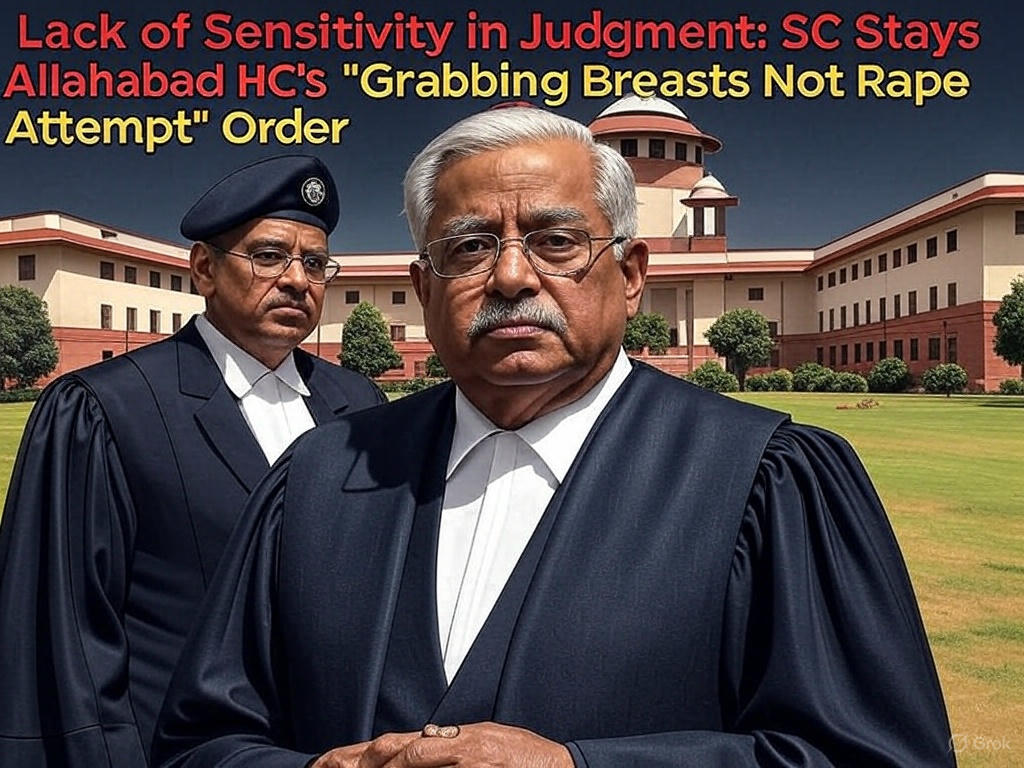The Apex Court has recently stayed a contentious judgment of the Allahabad High Court. The judgement in issue had lately ruled that acts such as grabbing the breasts of a minor, loosening the string of her pyjamas, and attempting to drag her under a culvert did not amount to an attempt to rape.
The judgment was delivered by Justice Ram Manohar Narayan Mishra on March 17, 2025, and it has sparked a nationwide outrage has forced the Supreme Court to take suo motu cognizance of the matter.
How did the controversy emerge?
In 2021, two accused, Akash and Pawan, allegedly assaulted an 11-year-old girl. According to the prosecution, the accused had offered the child a lift, grabbed her breasts, attempted to remove her lower garment, and tried to drag her under a culvert. A fortunate and bold intervention of a passerby prompted the accused persons to run away from the scene.
The trial court had summoned the accused under Section 376 of the Indian Penal Code for rape and Section 18 of the POCSO Act, 2012, for attempted rape.
However, in its March 17 ruling, the Allahabad High Court modified these charges, stating that the accused should instead be tried under Section 354-B IPC (assault or use of criminal force with intent to disrobe) along with Sections 9 and 10 of the POCSO Act (aggravated sexual assault).
Justice Mishra held that while the actions of the accused were reprehensible, they did not constitute an attempt to commit rape as the prosecution had not established that the crime had progressed beyond mere preparation.
Supreme Court Intervention upon National Outrage
The ruling led to immediate backlash from legal experts, women’s rights organizations, and government officials.
Senior Advocate Indira Jaising and the NGO We the Women of India urged the Supreme Court to take suo motu cognizance of the matter. Union Minister for Women and Child Development, Annapurna Devi, also condemned the judgment. She stated that the judgement was “wrong” and also warned that it could send a dangerous message to society.
On March 25, a bench of Justices B.R. Gavai and A.G. Masih of the Supreme Court took cognizance of the case and expressed their deep dismay at the High Court’s insensitivity.
Solicitor General Tushar Mehta argued that some judgments are so flawed that they justify immediate intervention, and this was one such instance.
Supreme Court’s Observations and Order
On March 26, the Supreme Court formally stayed the Allahabad High Court’s judgment, noting that it demonstrated a “total lack of sensitivity.”
The bench stated that while courts are generally reluctant to stay judgments at an early stage, the comments made in paragraphs 21, 24, and 26 of the High Court’s ruling necessitated intervention.
The order read:
“We regret to say that it demonstrates a total lack of sensitivity from the author of the judgment. This decision was not made impulsively; it was delivered four months after the judgment was reserved, indicating a deliberate application of mind. While we are usually reluctant to grant stays at this stage, the observations in paragraphs 21, 24, and 26 are contrary to legal principles and display an inhuman approach. Therefore, we stay the observations in those paragraphs.”
The Court issued notices to the Union Government, the Uttar Pradesh Government, and all parties involved in the High Court case. It also sought the assistance of Attorney General R. Venkataramani and Solicitor General Tushar Mehta in the matter.
Implications of the Supreme Court’s Stay
The case is a perfect illustration that highlights the judiciary’s evolving approach to gender justice and child protection laws. The Supreme Court’s suo motu cognizance to check for sensitivity in judicial reasoning, especially in cases involving sexual offenses against minors., was decisively critical.
Legal experts believe that the stay not only prevents a dangerous precedent from being set but also signals the Court’s commitment to upholding stringent protections for child victims.
The controversy also raises broader questions about judicial accountability. Critics argue that judgments reflecting regressive interpretations of sexual offenses undermine years of legal progress and the intent of laws such as the POCSO Act.
Some legal commentators have called for judicial training programs to ensure a more victim-centric approach in cases of sexual violence.

Tanishq, a law student at the Department of Legal Studies and Research, Barkatullah Vishwavidyalaya, Bhopal, is a budding legal writer with a sharp eye for evolving legal landscapes. Passionate about Intellectual Property Rights, Constitutional Law, and Women and Child Safety Laws, Tanishq actively explores contemporary legal nuances through writing and research.
References:
- https://www.scobserver.in/journal/total-insensitivity-supreme-court-stays-recent-allahabad-hc-judgement-on-attempt-to-rape/#:~:text=attempt%20to%20rape-,’Total%20insensitivity’%3A%20Supreme%20Court%20stays%20Allahabad%20HC,judgement%20on%20attempt%20to%20rape&text=Today%2C%20a%20Division%20Bench%20of,charge%20for%20attempt%20to%20rape.
- https://lawchakra.in/supreme-court/allahabad-hcs-grabbing-breasts-stayed/

